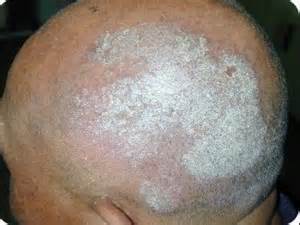Psoriasis Articles:
Online and Print Publications and Research Findings
Reading psoriasis articles from a variety of websites enlightens and instructs psoriasis patients about the latest psoriasis treatments and research findings. For example, articles exploring topics as diverse as scalp psoriasis, infant psoriasis and using Dead Sea Salts to relieve psoriasis symptoms are often available from one website.
Scalp Articles

An article about scalp psoriasis offers the following helpful information:
- Scalp psoriasis frequently occurs during outbreaks of other psoriasis types.
- Infections, climate, stress, and medications are common triggers for scalp psoriasis flare-ups.
- Most patients suffering from scalp psoriasis have lesions affecting other parts of their body as well.
- In scalp psoriasis, silvery scales attach to hair shafts and scalp, often causing bleeding when removal is attempted.
- Because scalp psoriasis resembles seborrheic dermatitis, patients should visit a doctor to obtain a correct diagnosis before initiating treatment.
- Common treatments for scalp psoriasis include shampoos containing coal tar and salicylic acid and prescriptions such as Tazorac, Anthralin and Dovonex.
Natural Treatment Psoriasis Articles
Other psoriasis articles may explore natural, more holistic treatments for psoriasis, such as an article discussing the potential for relief from the itching, flaking and redness of psoriasis provided by herbal medicines. Some interesting information contained in articles regarding alternative treatment methods include:
- An excellent moisturizer and natural soother of irritated skin, aloe vera leaves are first crushed then rubbed over the plaques for immediate relief from itching and dryness.
- Because it contains rich amounts of gamma-linoleic acid, evening primrose oil is used to alleviate inflamed psoriasis lesions. This herb is available as a ointment or as an oral dietary supplement.
- Calendula is an essential oil providing antioxidants that fight infection and stimulates blood circulation that helps loosen layers of dead skin cells comprising psoriasis plaques
- Neem oil extracted from the seeds and fruits of an Indian evergreen tree naturally contain ingredients found in synthetic psoriasis medications, such as steroids and omega fatty acids. Neem is also considered an immune system booster that seems to help alleviate other skin infections, especially eczema and dermatitis.
- Some research into milk thistle indicates that this herb may inhibit rampant T-cell growth, one of the main causes of psoriasis. Milk thistle extract is applied directly to psoriasis lesions or is taken as a dietary supplement.
Scientific Articles
Dendritic Cells and Psoriasis
Psoriasis posts supply clinical details. A write-up released online at Scientific research Daily on May 24, 2010 talks about searchings for including dendritic cells located in psoriasis plaques. Baseding on the write-up, immature dendritic cells make up almost 90 percent of each plaque along with consisting of big quantities of genetics that identify them from various other "tissue-resident" dendritic cells discovered in psoriasis sores.
The write-up clarifies the relevance of this searching for by mentioning that understanding which particles are most energetic in psoriasis episodes is important to comprehending exactly what activates psoriasis as well as how you can stop such triggers from affecting genetically-prone people.
Childhood Obesity and Psoriasis Connection
Further reading of online psoriasis articles finds that childhood obesity may be associated with later development of psoriasis, as well as a vulnerability to heart disease.
In an article published on May 18, 2011 in the Los Angeles Times, researchers working for Pasadena, California's Kaiser Permanente Southern California's Department of Research & Evaluation report that people suffering from childhood psoriasis should be consistently monitored for indications of impending cardiovascular disease resulting from increased levels of cholesterol exacerbated by psoriasis.
According to research conducted by epidemiologist Dr. Corinna Koebnick, findings gathered from studying over 700,000 health records of children with ethnically diverse backgrounds indicate that "obese children were 40 percent more likely to develop psoriasis in childhood than children who were height/weight proportionate".
Dr. Koebnick also found that "severely obese children were 80 percent more likely to suffer from psoriasis". She recommends that the parents of children with psoriasis have their children monitored regularly for any signs of possible heart problems. Reading up-to-date psoriasis articles provides psoriasis sufferers and the people who care about them with pertinent information that can help them discover new treatment methods that could possibly lead to remission of the disease.
Sitemap in alphabetic order
Information about the causes of Psoriasis
National Institute of Arthritis and Musculoskeletal and Skin Diseases
 Psoriasis en la pierna
Psoriasis en la piernaPágina de inicio
Mapa del sitio
Mapa del sitio en orden alfabético